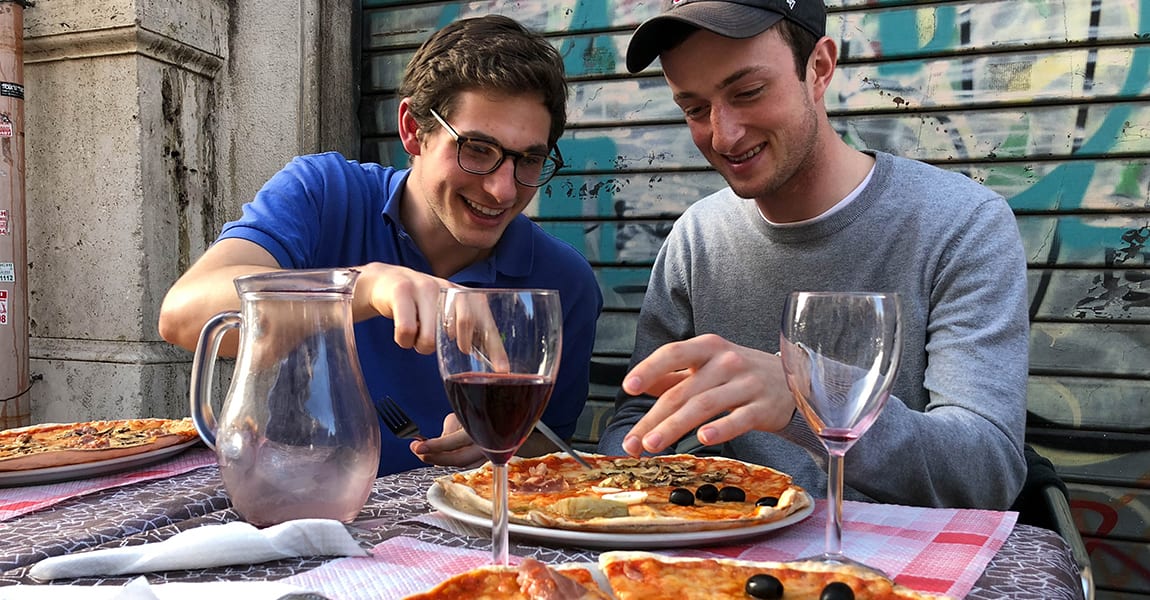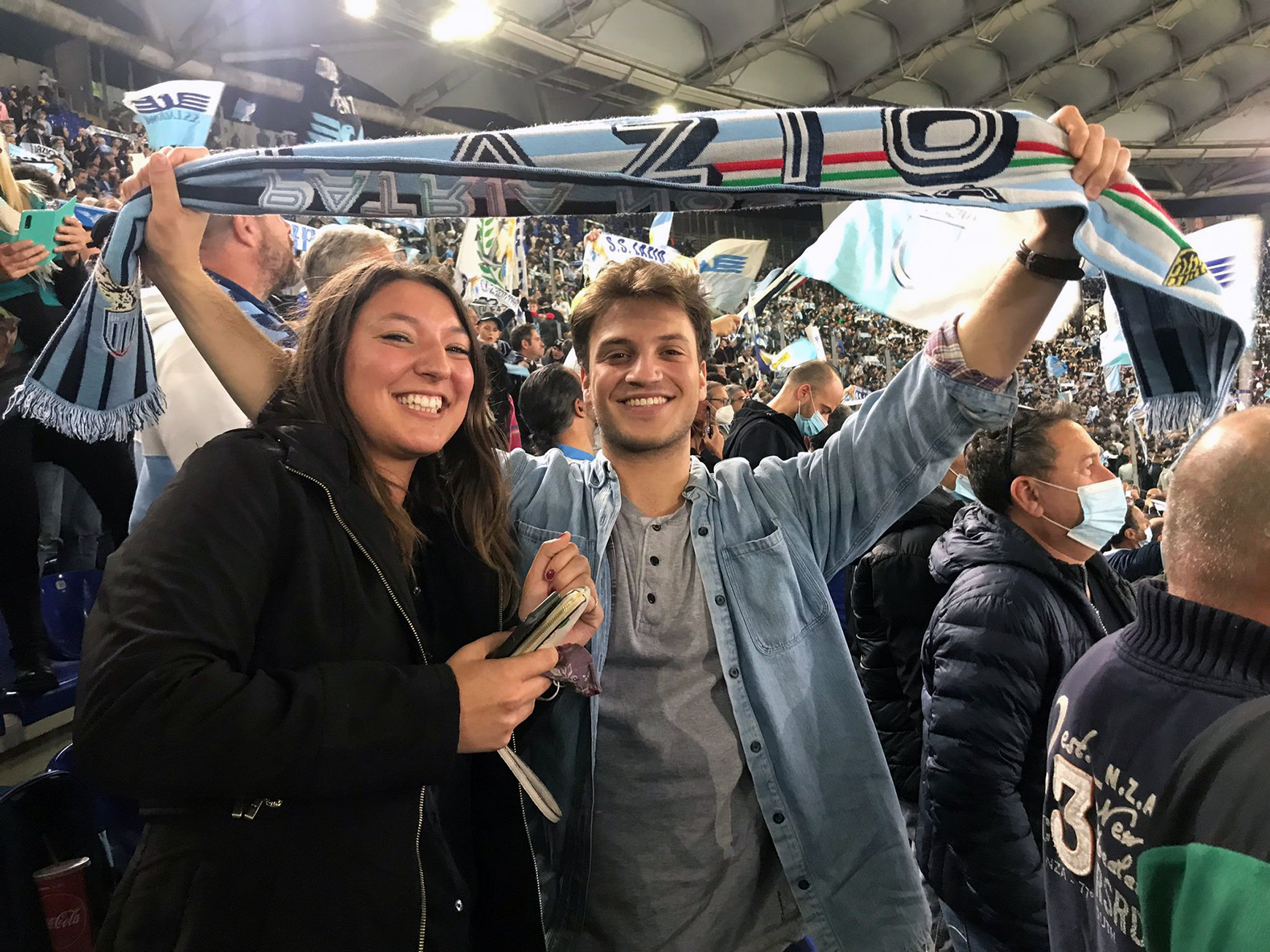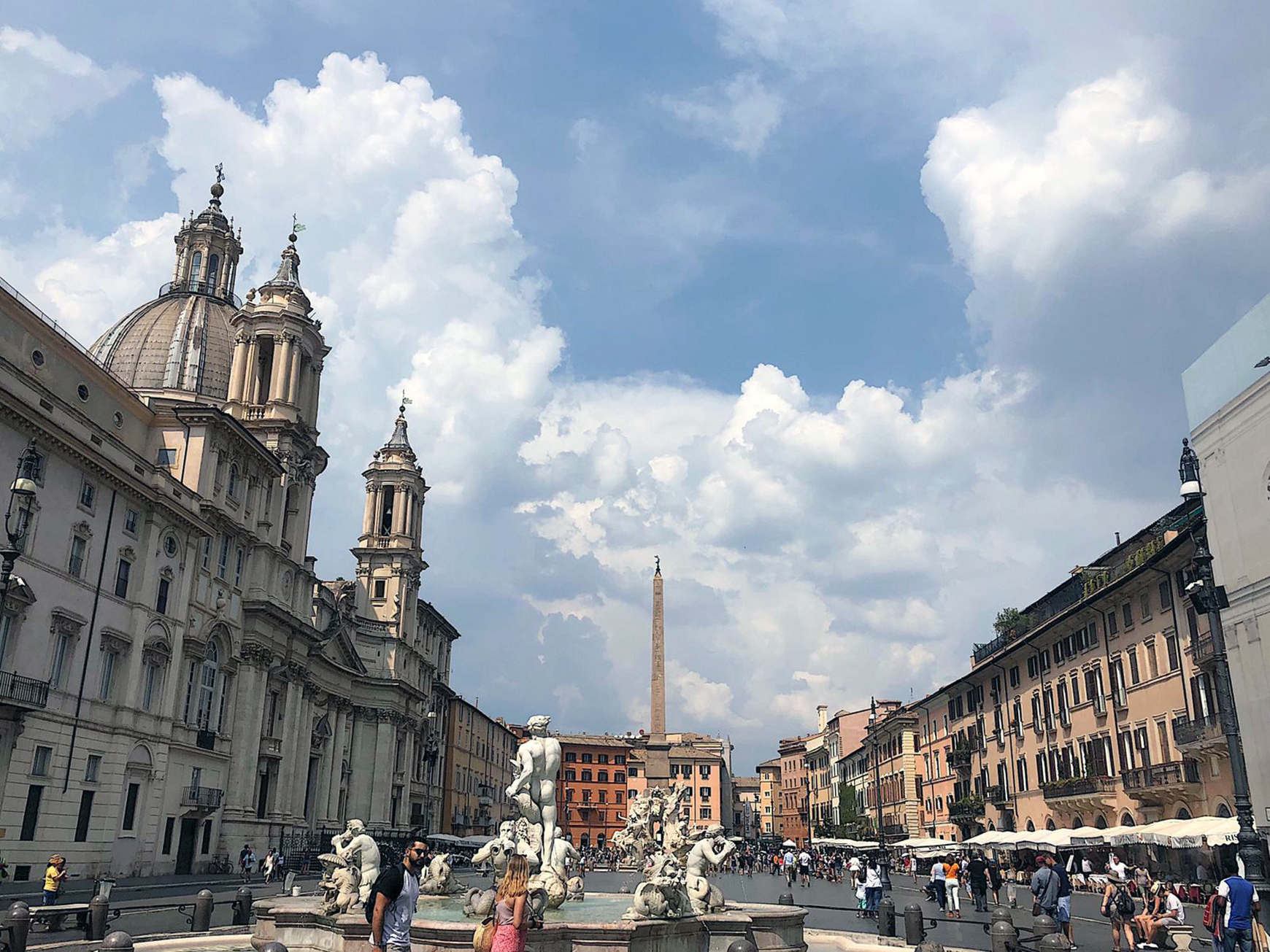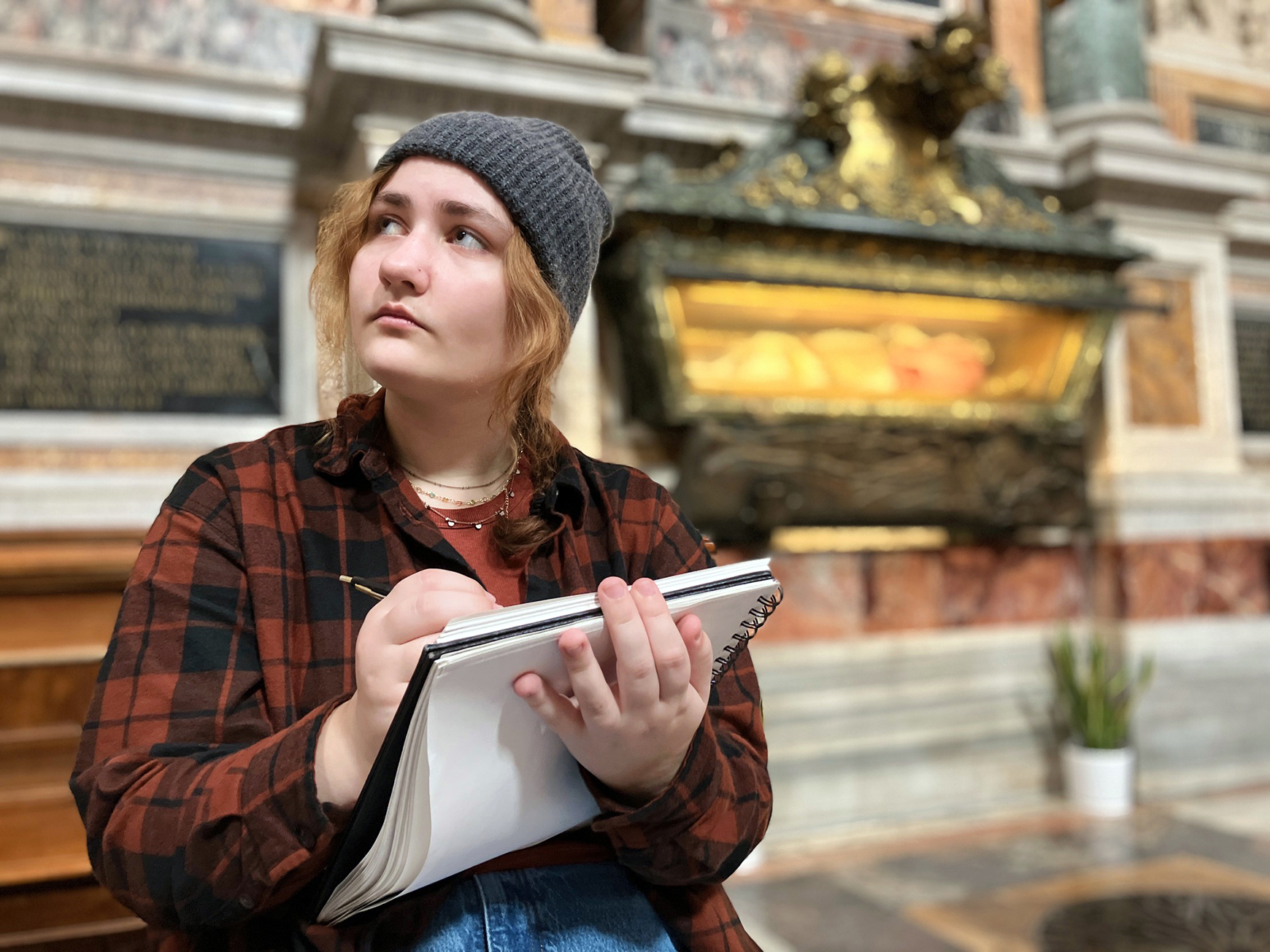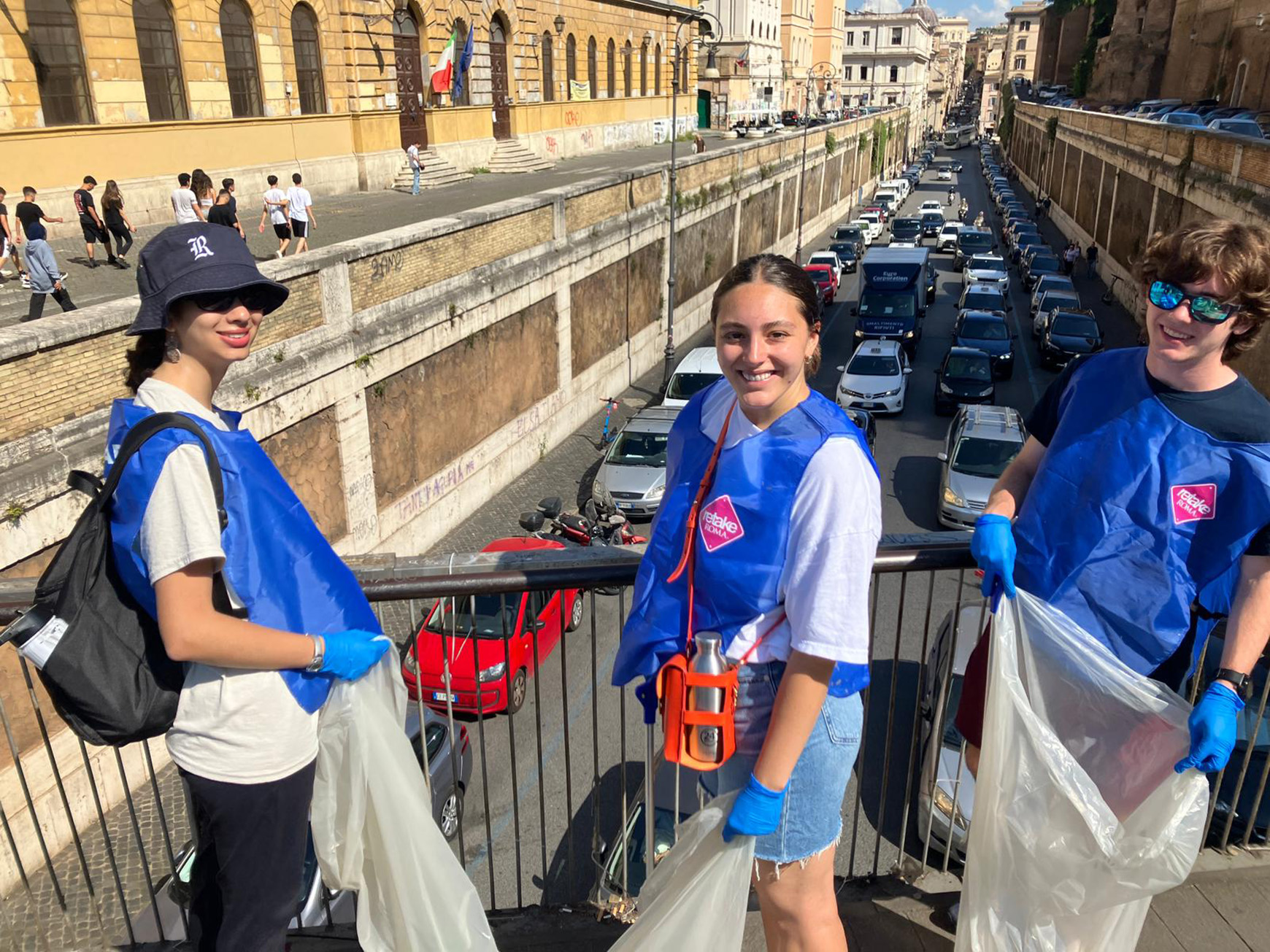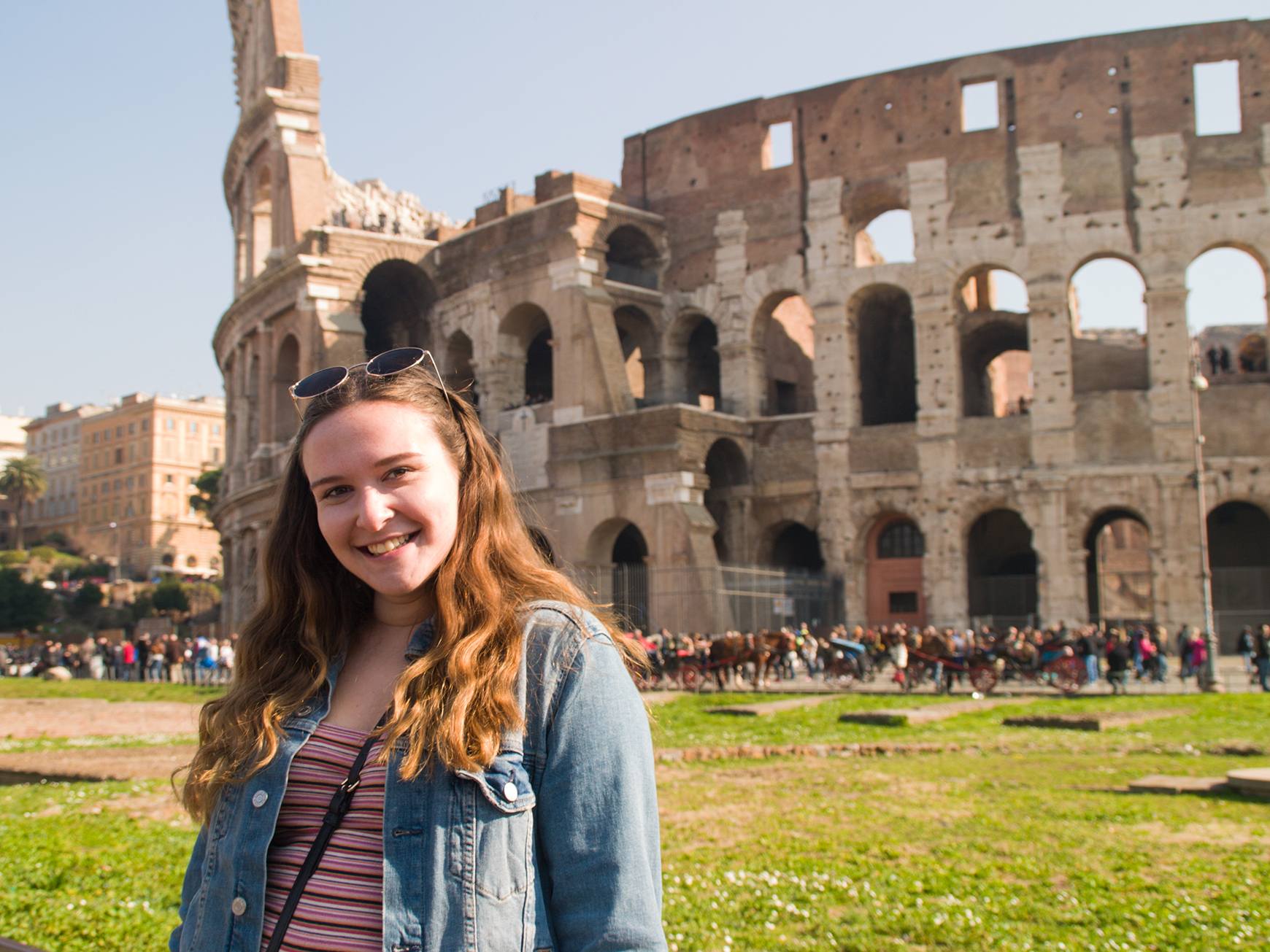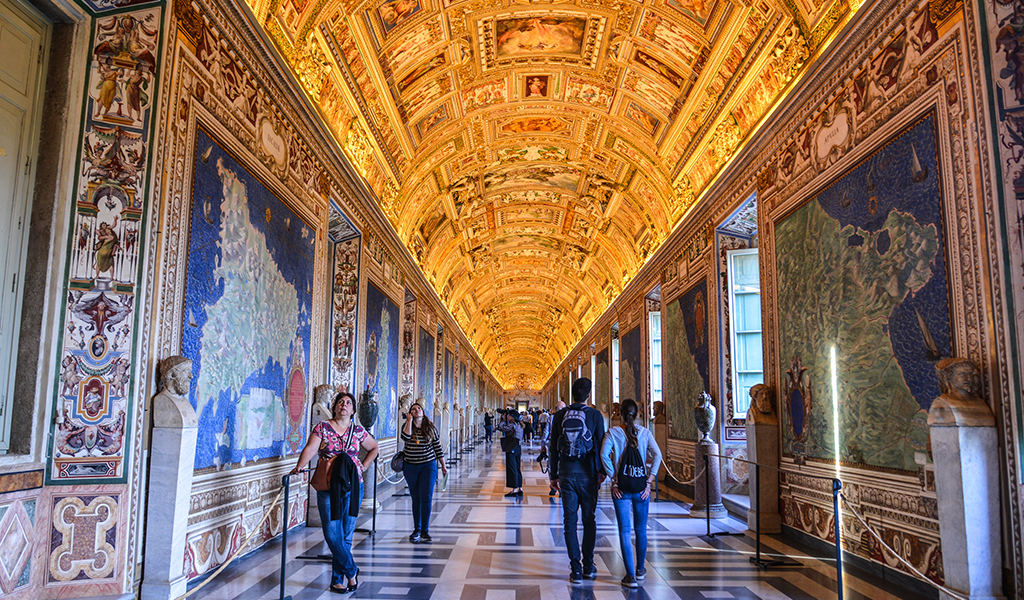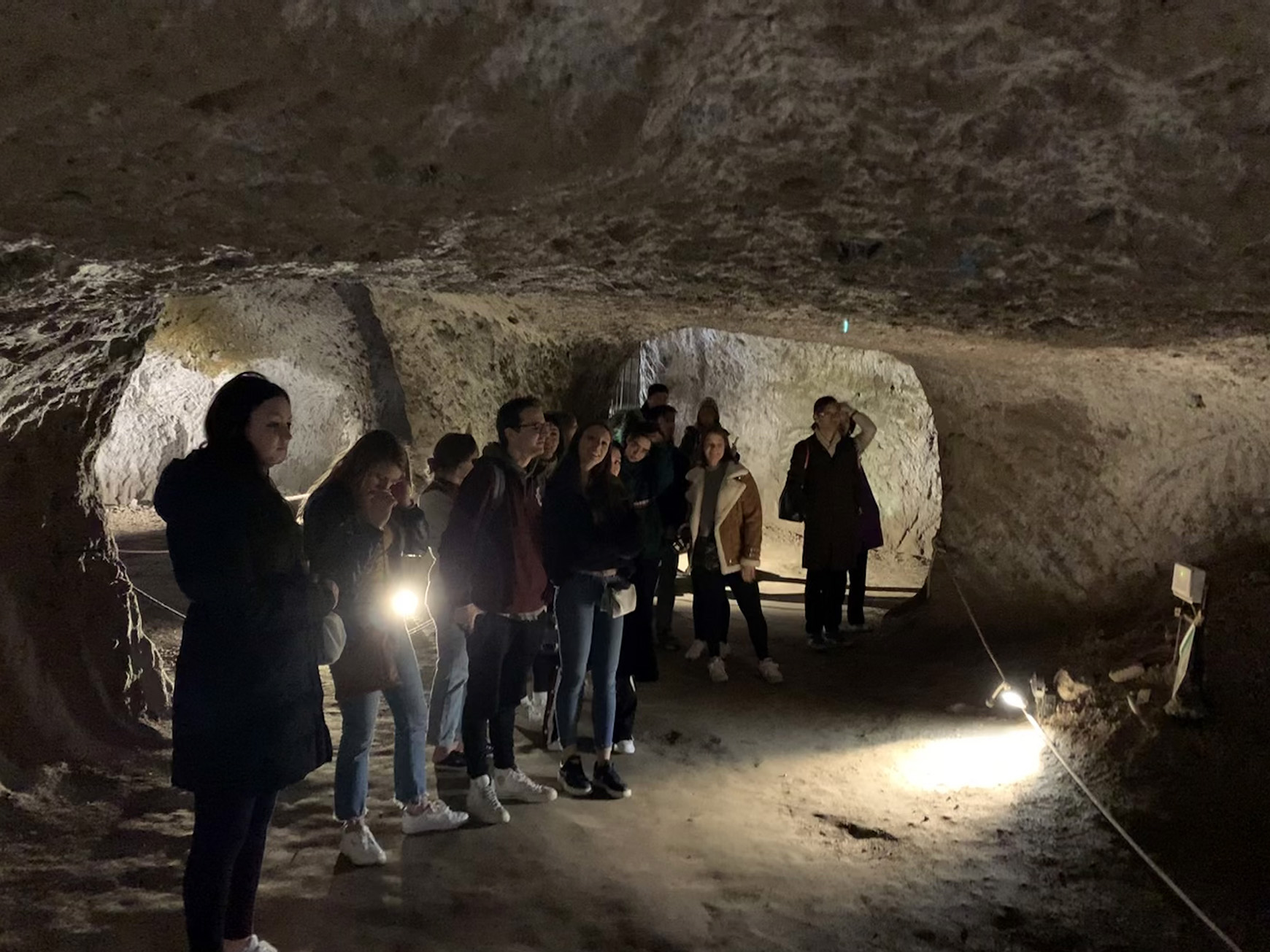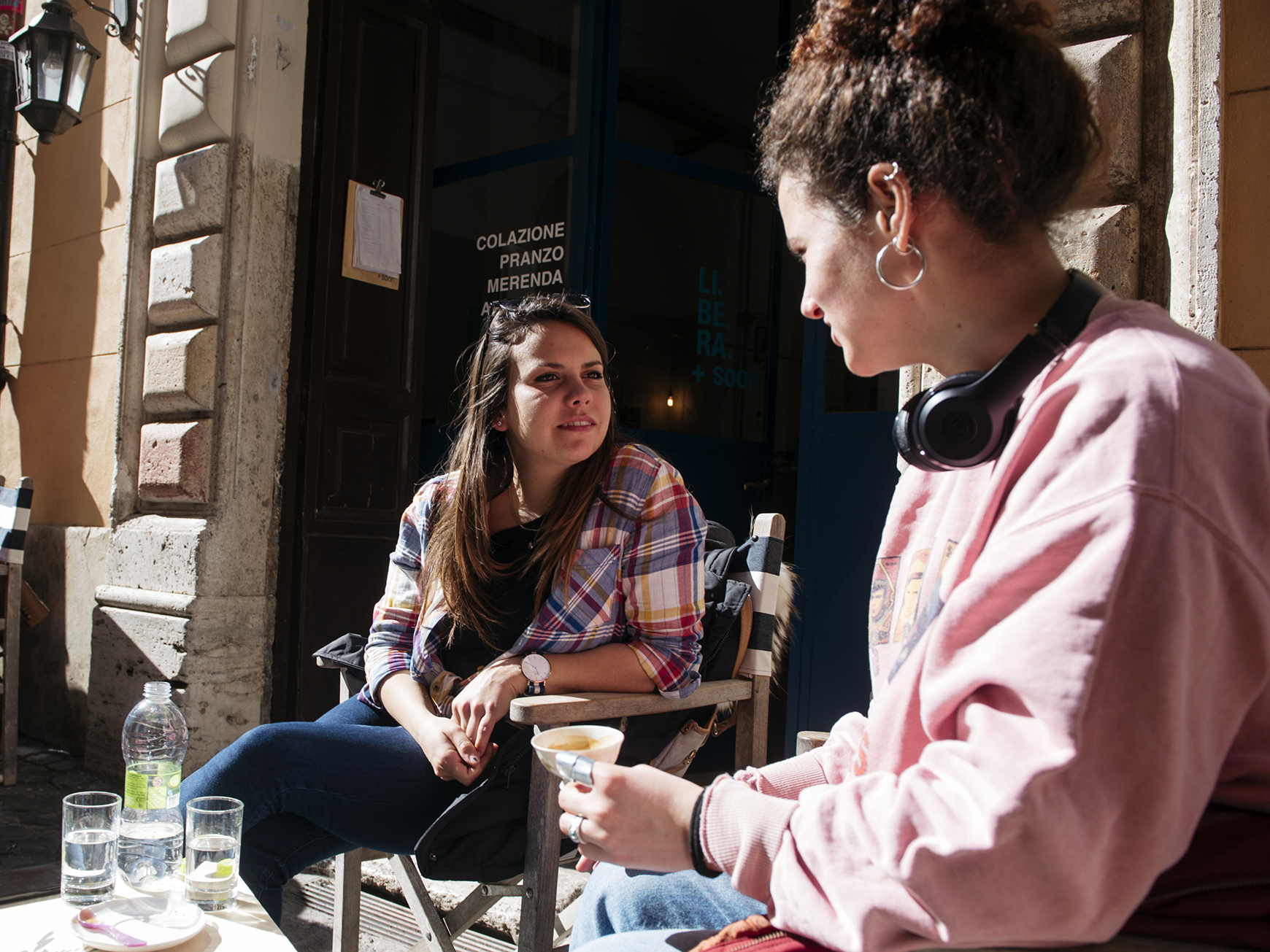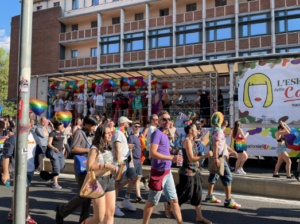Rome, Italy
IFSA Study in Rome
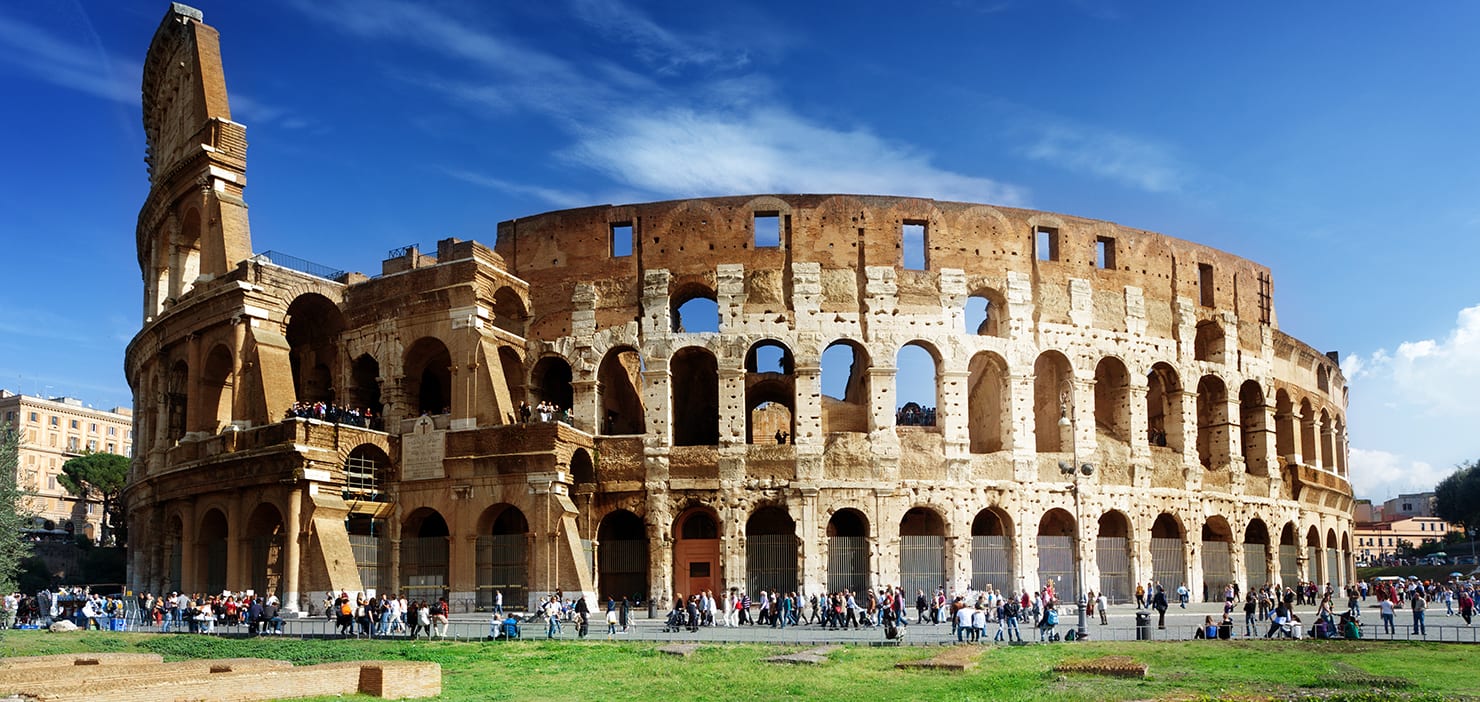

Program Overview
OUR MOST AFFORDABLE ROME OPTION INCLUDES ACCESSIBLE GPA REQUIREMENTS
If you’re ready to start exploring, this is the program for you! While making Rome your home, you’ll feel empowered to take a seat at the table and find your voice among other influencers. Classes and internships are designed to prepare you for your future role in local and global networks.
IFSA puts it all in reach. Take classes at the IFSA Program Center with other IFSA students, taught by Rome-based faculty. Select from business, communications, political science, social sciences, sustainability studies. There’s also opportunity for an internship.
For deeper immersion, opt to enroll in a class of your choice at the elite Libera Università Internazionale degli Studi Sociali (Luiss), for an additional fee. Luiss offers top-quality instruction in business, economics, finance, political science, pre-law, social sciences, sustainability studies, and more. As a Luiss student, you can also take advantage of university clubs and other offerings.
This is an exclusive IFSA-Designed Program. Learn more about these affordable programs here.
Details at a Glance
Application deadline
Minimum GPA
2.00
Credit load
12–16
Housing
Apartment/Flat, Single Room Option
Instruction language
English, Italian
Language prerequisites
None
Visa required?
Not in most cases. Learn more.
Academics
IFSA’s Study in Rome program provides a compelling curriculum in English focused on business and the social sciences. Crafted for U.S. degree requirements and contemporary hot topics, IFSA classes explore relevant topics in the Roman, Italian, and European contexts by incorporating a variety of case studies and field visits. Take IFSA elective classes for 12-16 credits. Classes are open to all students without prerequisites.
Not all classes may be offered in a given semester. Click on each link below for a detailed class syllabus.
Beginning Italian 1
Italian language study at beginning through advanced levels is available upon request and based on previous language experience. (3 U.S. semester credit hours)
Directed Research
This class offers a unique opportunity for students to delve deeply into host context research projects. Students will be guided through projects that are both feasible in the study abroad context and relevant to their broader intellectual interests. The class is structured through regular individual meetings with a faculty mentor to discuss the formation and execution of a research plan and, depending on the specific project, the possibility to conduct field- or internet-based research. At the end of the semester, students present a formal research paper. (3 U.S. semester credit hours)
Essential Italian
This is an introductory class in Italian language and culture. By introducing key words and phrases and venturing out into the city to practice them, you’ll gain essential skills to communicate effectively and navigate in a new culture. (1 U.S. semester credit hour)
Ethical Decision-Making
This course invites students to examine a number of ethical issues revolving around economic order and business by understanding the context in which business agents operate. From empirical and normative perspectives, students engage with theory from moral philosophy, organizational behavior, economics and management, with cases that illustrate the ethical issues in the business environment. (3 U.S. semester credit hours)
Food, Culture, and Identity in Italy (Coming Spring 2026)
This course explores the complex relationships between Italian cuisine, history, and society, with a special focus on Rome as a case study of national food traditions. Through an interdisciplinary lens, students will examine the evolution of Italian food culture across regions, the impact of globalization, and the economic significance of the “Italian” brand in global food markets. The course investigates how the food industry shapes narratives around tradition and innovation in Italian cuisine. Students will engage with local markets, artisan producers, and historical culinary sites to gain firsthand insight into the cultural and economic significance of food in Italy. Assignments include reflective tastings, comparative food analyses, and collaborative projects that critically evaluate the intersection of food, heritage, economics, and modern consumption.
Forced Migration, Refugees, and Change
More than 60 million people are displaced by war, violence, and environmental destruction today. Using ethnographic approaches, students investigate sociological and political forces behind the current increase of refugees impacting Europe, considering what has been accomplished and what can be done in the future through governments, NGOs, citizens, and researchers to address challenges with forced migration. (3 U.S. semester credit hours)
Intercultural Communication for the Global Workplace
Designed to improve students’ abilities to communicate effectively with people from diverse cultural backgrounds, this course utilizes intercultural theory, verbal and non-verbal communication, personal beliefs and values, and strategies for building cultural intelligence and adaptability. Examination of Italian work environments, professional practices, and business etiquette underpin the course. (3 U.S. semester credit hours)
Intermediate Italian (Coming Spring 2026)
This course builds upon a foundational knowledge of the Italian language and culture. Designed for students with prior basic proficiency, the course aims to enhance vocabulary, refine grammatical accuracy, and foster more fluid conversation skills. By immersing students in authentic texts—ranging from short stories and films to articles on contemporary Italian culture—this course challenges students to engage with the Italian language and its nuances. The course begins with a thorough review of foundational structures before introducing more complex grammatical forms. Advanced structures like the subjunctive and conditional moods are introduced progressively after students have consolidated their command of essential tenses and vocabulary.
International Internship Seminar
All internships include participation in the International Internship Seminar, which covers 15 hours of online asynchronous Canvas modules to provide structured opportunities to reflect on the practical experience of the internship, learn more about your host country’s business culture, and further develop the professional skills needed for a successful transition from undergraduate coursework into a career or graduate school. Plus, you will engage with an online global cohort of IFSA internship participants, gaining exposure to business cultures around the world. Seminar is taught in English. (3 U.S. semester credit hours)
International Political Economy
This course explores theoretical issues and illustrative case studies related to international political economy. Students examine ways domestic and international politics affect relations between states by examining the role of government in the production, distribution, and consumption of resources. Students also learn to apply core concepts and theories in international political economy to case materials. (3 U.S. semester credit hours)
Italian Art, Power, and Influence
Art and culture reflect the society they stem from, and at the same time they can be vehicle for political messages and even play a role in international relations. This course will explore how the “soft power” of art — including literature, cinema, architecture, and visual arts in general — can be leveraged by individuals, groups, or governments as they promote their ideas and values for political gain and influence. Students visit famous monuments, museums, and architectural sites that showcase more than 2,000 years of Italian history through its great artists and leaders. (3 U.S. semester credit hours)
Museums and Society in Rome (Coming Spring 2026)
This course provides a comprehensive exploration of museum studies, using Rome’s iconic collections as a backdrop to analyze the evolution, function, and contemporary challenges museums are facing today. Through critical inquiry, students will engage with key issues such as curation, exhibition design, audience interaction, and ethical dilemmas in the museum world. The course emphasizes the role of museums as dynamic cultural institutions, shaping public memory and identity. With a focus on both theoretical frameworks and practical applications, students will examine how museums navigate issues like repatriation, inclusion, and the impact of technology. Visits to pivotal institutions and guest lectures from museum professionals will enrich students’ understanding of the ever-evolving landscape of museum practice.
Politics of Food and Water
Global population growth is dramatically increasing our demands for food and water, contributing to a degradation of natural resources, reduction of biodiversity, and climate change. Students will explore environmental challenges in light of political strategies that promote sustainable food production and water management. This course will feature multiple case studies on Rome, where unique water management strategies — beginning with ancient aqueducts — have traditionally shaped the identity of the city till the present day. (3 U.S. semester credit hours)
Service Operations Management (Coming Spring 2026)
This course is designed to explore, challenge and refine the principles of service operations management with a special focus on hospitality and tourism operations. With 58 million visitors to Italy annually (Italy is the fifth most visited country in the world), Rome is an ideal site for applying course objectives. The foundation is built upon our understanding that service excellence is achieved through strategy, systems and staff.
By the end of this course, students should learn how organizations manage and improve their service operations. The course will analyze service delivered to customers inside an organization (such as staff in other functions) or the service provided by public sector organizations, voluntary organizations, professional services, business to business services, retailers, and tourism and hospitality.
Sustainability, Urban Resilience, and Innovation in Rome (Coming Spring 2026)
How can big cities balance growth with historic preservation and modern sustainability efforts? This course explores the intersection of urban development, environmental sustainability, and policy-making in Rome—a city with over 2,500 years of history adapting to contemporary challenges. Students will examine topics such as green infrastructure, waste and water management, sustainable transportation, and climate adaptation strategies. Through site visits, guest lectures, and hands-on projects, students will critically assess Rome’s sustainability efforts while developing an informed opinion on some of the initiatives that might prove most successful for the future. The course incorporates diverse assessment methods, including research analysis, collaborative projects, and policy evaluations, to ensure students develop practical and theoretical expertise in sustainable urban planning.
Sustainable Tourism
In the past few decades, the global tourism industry has been increasingly criticized for its disruptive impact on local communities and the environment, while a growing trend of sustainable tourism has begun promoting more responsible, eco-friendly approaches that can help preserve nature, customs, and lifestyles. This course introduces skills and techniques that can be leveraged to expand sustainable tourism, by understanding market needs and designing innovative communication that seeks to make tourist destinations better places to live in, and to visit. (3 U.S. semester credit hours)
LUISS UNIVERSITY
If you choose one direct-enroll class at Luiss. An elite private institution, Luiss University boasts the top-ranked political science program in Italy, as well an impressive economics program. For business and finance major, Luiss holds both AMBA and EQUIS accreditation and consistently ranks among the top 100 European business schools. Select law classes are open to you if you are interested in a legal or political career. Some popular options are listed below, but you will have access to any class available to visiting students.
Students may only take undergraduate-level classes.
Credit Conversions
The standard conversion rate from Luiss to U.S. semester credits hours is 2:1.
- 6 Luiss credits = 3 U.S. semester credit hours
- 8 Luiss credits = 4 U.S. semester credit hours
LUISS Featured Direct-Enroll Classes
- Behavioral Economics
- Blockchain and Cryptocurrencies
- Competition Law and Antitrust Regulation
- Corporate Finance
- Databases and Big Data
- Digital Economy and Innovation
- Energy Markets and Industrial Organization
- European Union Law
- Financial Market Analytics
- Gambling: Probability and Decision
- Global Governance Through Interreligious Dialogue
- History of Political Thought
- Legal System in the Digital Age
- Money and Banking
- Public Economics
- Sociology of Terrorism
Prerequisites
- The Luiss requires a 2.7 GPA minimum for enrollment in its classes.
Luiss Restrictions
Students may only take undergraduate-level classes.
Classes in the following programs are not open to study abroad students:
- School of Government programs
- School of Journalism programs
- School of Law programs
- Language courses other than Italian
- School of European Political Economy programs
- All one year master’s programs
- Post-graduate and PhD courses
- Luiss Business School and MBA programs
- Workshops and Seminars
- Digital Program: Marketing
- Digital Program: Strategic Management
DIRECTED RESEARCH
Engage in individualized field research with faculty experts on a contemporary issue of interest. Regular meetings with faculty will assist in the formation and execution of research plans, and they will guide you on how to thoughtfully and critically integrate academic research with experiential learning. You will sharpen your written and oral communication skills through the development of articulate and comprehensive research that is respectful to the sensitivities of the local culture.
If you chose to research live human subjects, live animals or another topic that is deemed by IFSA to be required to be reviewed by the Institutional Research Board (IRB) at your home institution, then you will have to file your project with your home institution’s IRB board and submit your result to IFSA. Your IFSA Enrollment Counselor will review your application materials to help determine if you must file with IRB.
For more detailed information and examples of previous student placements, contact your IFSA Enrollment Counselor.
INTERNSHIPS
IFSA internships include real-world work experience, along with developing intercultural skills and experiences that are key to personal, academic, and professional success. Expect to devote a total of 120 hours working with your host organization, with supervision from your seminar instructor, coordinated by on-site IFSA team members. In addition, interns complete the International Internship Seminar for 3 U.S. semester credit hours. Internships are not remunerated.
Students have interned at galleries and museums, business incubators, development agencies, religiously affiliated non-profits, and human rights advocacy groups in Rome.
Your goals are carefully considered, tailoring the placement process to ensure the best possible fit. Keep in mind that final placements depend on your skills, prior experience, and availability. Although every effort is made to match your placement with your preferred field or area of business, it can’t be guaranteed. Most internships are conducted in English. If you have had at least four semesters of Italian language instruction, you can ask your IFSA Enrollment Counselor about opportunities to conduct your placement in Italian.
Application. After you submit your application, resume, and IFSA Internship Interest Form, an IFSA Enrollment Counselor and an on-site IFSA Team member will work with you to identify your professional strengths, review your goals, and refine your internship interests to establish a match. From there, you’ll have an interview with your potential internship host. You will be provided with tips and resources to prepare for your interview.
Sample Placements. The following are examples of internships IFSA students have recently completed. Placement options vary from term to term.
Organization: This is a day center for refugees and asylum seekers. It offers services ranging from basic supplies, to legal and social counseling, employment support, language and skills courses, for nearly 150 people every day.
Subject Areas: Social Studies, Education, Communications, Political Science
Potential Projects: Interns will help with front desk operations, office management, intercultural mediation, as well as with promotional initiatives and event planning.
Organization: This Rome-based, independent, English-language, online magazine covers everything Italy-related, offering news and opinion about politics, economy, culture, and sports.
Subject Areas: Communications, Journalism, Marketing
Potential Projects: You will help with content creation for the magazine and promotion.
Organization: This English-language event and lifestyle magazine is targeted to tourists and expats visiting or living in Rome. It includes a daily listing of the latest and most diverse cultural and lifestyle events in and around Rome.
Subject Areas: Communications, Journalism, Marketing
Potential Projects: You will help with content creation for the magazine and promotion. You can also be involved in the creation of a new Florence branch of the magazine.
Organization: This is an historic Rome-based association, one of the first in Italy, that offers support to the LGBTQ+ community and organizes cultural events and initiatives, including the big annual Pride event.
Subject Areas: Communications, Cultural Studies, Gender Studies, Politics
Potential Projects: You will help with the organization of cultural events and contribute to the social media presence of the association.
Organization: This is a small private museum in the very heart of the historic center, focused on interactive reproductions of inventions and machines designed by Leonardo da Vinci.
Subject Areas: Communications, Museum Studies, Art History, Marketing
Potential Projects: Interns will help with front desk operations, English-led tours, as well as with promotional initiatives and social media campaigns.
APPLICATION REQUIREMENTS
Eligibility
- You must be at least 18 years of age. Students under 18 may be accepted on a case-by-case basis.
- You must be currently attending or recently graduated from a U.S. or Canadian community college, technical college, two-year college, four-year college, or four-year university.
- You must have completed at least one (1) full-time semester of study at your home institution before the beginning of the term.
- If you would like to pursue the option to take a class at LUISS a 2.7 GPA is required.
Recommendation Letter
Not required. A directed research or internship site may request a reference letter before placement is finalized.
TRANSCRIPT
Upon completion of your program, IFSA will send an official Butler University transcript to your home university with your coursework converted to the U.S. semester credit hour system. You will also have access to an unofficial transcript in your IFSA Student Portal. The transcript reflects classes taken, credits attempted, and grades earned during your term abroad. This service is included in your study abroad program at no additional cost. See our Transcripts page for more information.
Excursions
Activities and excursions are designed to pull you into the communities you visit and encourage cultural connections of every kind. There’s no extra fee to participate in these optional outings—everything is included in your program fee.
Below are a selection of activities and excursions from previous terms; options may vary for your program. Due to the seasonal nature of many of program activities, we cannot guarantee a specific activity or excursion will be available in a given term or program.
Activities
- Colosseum, Roman Forum, and Palatino Hill Tour: During orientation, seize this chance to get to know Rome by exploring some of the most iconic monuments in world history and the heart of the city.
- Sustainability Day with Legambiente: Raise awareness of the importance of protecting the environment by volunteering with this historic Italian association at a community garden in the Garbatella neighborhood.
- Traditional Roman Cooking Class: Enjoy Roman cuisine and learn the secrets of authentic homemade pasta during this cooking class and dinner.
- Cultural Exchange Aperitivo: Whether you’re perfecting your Italian language skills or just starting out, join local Italian university students at a local coffee bar to practice, compare cultural notes, and forge new friendships.
- Bay of Naples Trip: Your two-day excursion begins in Pompeii, where you’ll explore the archaeological remains, buried in the ash of Mount Vesuvius in 79 A.D. Next, discover the legendary beauty of the island of Capri. Finally, get to know historic Naples, a seaside city brimming with architectural treasures—and famous for introducing the world to pizza.
- Orvieto Day Trip: Enjoy a guided tour of Orvieto, an astonishingly preserved medieval town, including a visit to its impressive cathedral and to the famous St. Patrick’s Well.
Housing and Meals
Housing
Apartment/Flat, Single Room OptionMeals
Self-CateringDetails
Rome students typically live in fully-furnished apartments shared by four to six students in Rome’s historic center, Prati, or Trastevere neighborhoods. Apartments vary but are generally in updated historic buildings in neighborhoods with plenty of local charm, an easy 30- to 45-minute commute from the IFSA Program Center, either on foot or using public transit.
Your apartment mates could include other study abroad students, as well as students from Italy or other countries, and could be mixed gender. Most apartments have two or more bathrooms. Bedrooms are typically shared by two IFSA, same gender students. In a few cases, depending on the specific apartment layout, triple, or single rooms are possible. In some cases, there’s an option to request a single, private room by paying an a supplemental fee. Students are responsible for meals.
Sample housing
Explore Via Cola di Rienzo 285 to see what your Rome home might be like:
- Location: The Prati district, close to Rome’s historic city center.
- Commute: A six-minute walk to the IFSA Program Center.
- Living space: Apartments for four to six students in older, historic buildings. Students share bedrooms with two, same gender students per room. Bedrooms include single beds and storage. All residents share the living space, kitchen, eating area, and bathroom(s). Sometimes two students share one desk. Complete bedding and towels provided. Kitchens are equipped with oven, refrigerator, and basic dishes and kitchenware.
- Meals: No meal plan. Students prepare or purchase meals, and often tell us cooking together is a fun, social part of the day. Plus, we’ll share pro grocery shopping tips when you arrive.
- Other details: Wi-Fi included. Laundry washing machine and drying rack. Vacuum cleaner. Iron and ironing board. Fans. Air conditioning is common but not guaranteed. Weekly cleaning service of shared spaces is often included.
- Nearby: Cafes, markets, shopping, public transportation. Vatican City. Castel Sant’Angelo. Tiber River. Piazza del Popolo. Villa Borghese. Spanish Steps. Piazza Navona and the Fountain of the Four Rivers.
Dates and Fees
Get Started

Eleni Katsarelas
Enrollment Counselor
